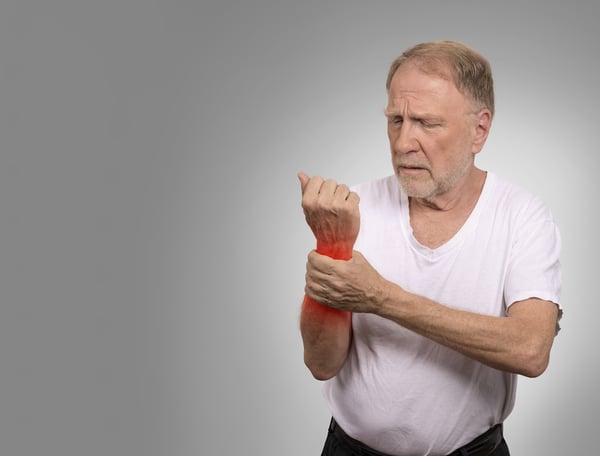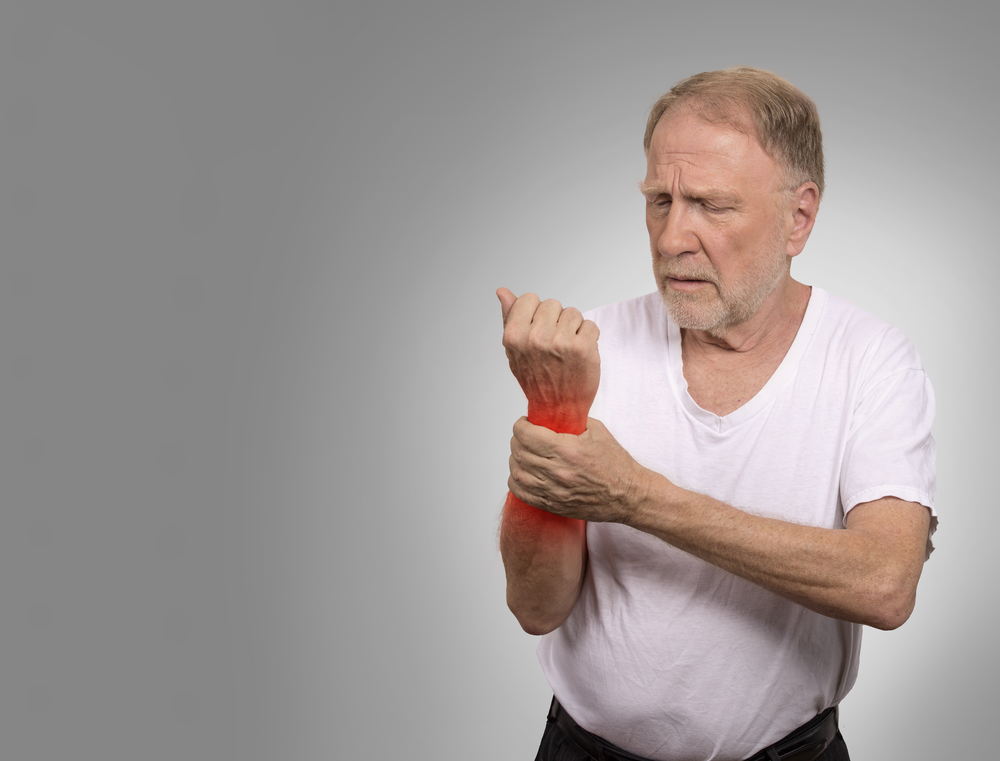One in five adults suffer from arthritis, and the majority of these are seniors.

For those that live with arthritis every day, the symptoms can be a barrier to doing the hobbies they love. But with management strategies and lifestyle changes, many seniors find that they can continue the activities that bring them hope, purpose and joy.
For older adults to understand the stages of living with arthritis, it’s helpful to talk about how the disease is identified, diagnosed and managed.
Signs and Symptoms
Generally, symptoms of arthritis can include any of the following: joint redness, swelling, pain, stiffness, warmth, or difficulty with movement. Many people are familiar with arthritis of the hands and feet, but they don’t always realize that it can affect any joint in the body. Anyone experiencing these symptoms should visit their physician.
Diagnosis
When diagnosing arthritis, medical professionals will typically conduct a physical exam and gather medical history and genetics information to help identify the type of arthritis. Blood tests and imaging may be necessary as well. While arthritis cannot be cured, it can be managed to limit the impact it has on seniors.
A physician can recommend arthritis management strategies and approve all plans to change or increase physical activity. Strategies for arthritis management can include:
- Lifestyle changes: Seniors with arthritis may need to stop performing certain activities, or limit them. Depending on the area of the body affected, some hobbies may become more difficult. However, planning ahead can be helpful – for example, having a stool to sit on in the kitchen can help seniors that want to cook but have difficulty standing for long periods of time due to arthritis pain.
- Movement: For some types of arthritis, sitting or working in one position for too long can cause the condition to worsen. Moving, walking and stretching every 15 minutes can be helpful. For some, setting an alarm as a reminder to prompt movement can be helpful. A doctor should be consulted before seniors begin any exercise regimen.
- Weight: Maintaining a healthy weight can be helpful in managing arthritis. Excess weight can cause strain on joints, worsening the condition. Anyone concerned about this should consult their physician for exercise and diet recommendations.
Education and awareness are critical – seniors that may have arthritis, or have already been diagnosed, should engage their care team to develop management strategies.
Exercise
Check with your doctor first, but most will recommend that you continue to get plenty of exercise.
Often, they will recommend weight-bearing exercise, however, it should be low impact and not traumatic to the joints. For instance, if you’re doing aerobics you may want to consider doing it in a swimming pool. Reasons for exercise include:
- Strengthen the muscles around your joints
- Help you maintain bone strength
- Give you more energy to get through the day
- Make it easier to get a good night's sleep
- Help you control your weight
- Enhance your quality of life
- Improve your balance
Ask your doctor for a referral to a physical therapist and work with them to develop a plan for strengthening, low impact, and range of motion. Remember, start slow and use heat to help with any soreness or pain.
Medications
According to the Mayo Clinic, many types of medications are available for arthritis pain relief. Most are relatively safe, but no medication is completely free of side effects. Talk with your doctor to formulate a medication plan for your specific pain symptoms. Check out this information from the Arthritis foundation for a good discussion on medication management.
What to use:
- Over-the-counter pain medications, such as acetaminophen (Tylenol, others), ibuprofen (Advil, Motrin IB, others) or naproxen sodium (Aleve) can help relieve occasional pain triggered by activity your muscles and joints aren't used to — such as gardening after a winter indoors.
- Cream containing capsaicin may be applied to skin over a painful joint to relieve pain. Use alone or with oral medication.
Consult your doctor if over-the-counter medications don't relieve your pain.
What to avoid:
- Over-treatment: Talk with your doctor if you find yourself using over-the-counter pain relievers regularly.
- Under-treatment: Don't try to ignore severe and prolonged arthritis pain. You might have joint inflammation or damage requiring daily medication.
- Focusing only on pain. Depression is more common in people with arthritis. Doctors have found that treating depression with antidepressants and other therapies reduces not only depression symptoms but also arthritis pain.
Consider a Care Plan
A care plan for arthritis can minimize the impact of the disease on a senior’s life. The plan can be shared with everyone that is involved with caring for them. The plan should cover nutrition, medication, and exercise at a minimum. You may want to consider adding daily and weekly goals like doctors’ appointments, fun activities and a to-do list to encourage activity. As part of an individualized care plan, caregivers can also help with activities like cooking, cleaning and physical care.
References
Arthritis Foundation. “Understanding Arthritis.” Web.
Centers for Disease Control and Prevention. “5 Proven Ways to Manage Arthritis.” Web. 2019.
Quest Diagnostics. “Helping you focus on patients with arthritis” Web.
Everyday Health. “May is Arthritis Awareness Month – Mark it with the ABCs.” Web. 2018.
Mayo Clinic “Do’s and Dont’s for arthritis care”





